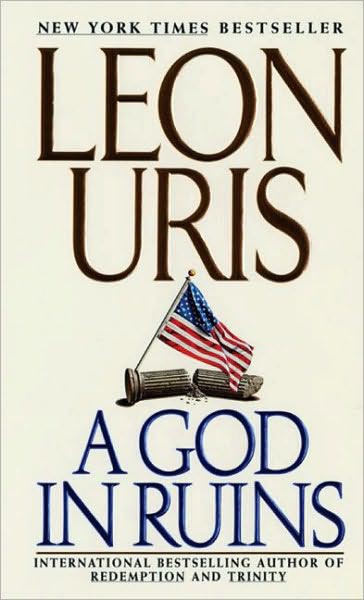
A God in Ruins PDF
Preview A God in Ruins
Veteran bestselling author Leon Uris (Exodus, Trinity) stays true to form with A God in Ruins, delivering yet another vast and vigorous novel about politics and history, right and wrong, love and loss. This time his country of choice is the United States, on the eve of the 2008 presidential election.
The incumbent, Thornton Tomtree, is running against the Catholic governor of Colorado, Quinn Patrick O'Connell. Thornton, who grew up playing in his daddy's Providence junkyard, made billions on a computer invention before becoming president. Brainy, calculating, and stiff, he lacks both charm and scruples--qualities that the honest and open Quinn, an ex-Marine, has in spades. Though set in 2008, A God in Ruins has its roots firmly in the past. In order to flesh out his characters, Uris casts his net all the way back to World War II, highlighting some of the more dramatic moments in Thornton and Quinn's lives as they move inexorably from youth towards a run for the White House. In the process, Uris takes up some of the attention-grabbing political issues in America from the second half of the 20th century: gun control, terrorist attacks, and Clinton's sex scandals.
Uris can always be counted on to inject the political with the personal, and Quinn is the perfect vehicle for this when his presidential bid is threatened at the eleventh hour by potentially damning information about his past. A lively supporting cast of characters--from Quinn's delicious wife Rita to Thornton's conflicted right-hand man Darnell--adds spark to this emotional story. At one point, when the campaign has reached a fever pitch, Thornton says about Quinn, "Our jingle-jangle rope-a-dope cowboy is going to be a handful." So is Uris's engaging book, which positively spills over with simple heroism and hot-button political issues. --Katherine Anderson
From Publishers WeeklyVeteran writer Uris (Exodus; Redemption) begins his 12th novel with a compelling premise: Quinn O'Connell is certain to become America's second Roman Catholic president, except that he discovers, a week before the 2008 election, that he was actually born Jewish. Adopted 60 years ago by a Catholic couple, and newly informed by his long-lost Jewish half-brother of his heritage, O'Connell now asks a difficult question: Is America ready to elect a Jewish president? This initial introduction of the issue of anti-Semitism seems promising. Uris obviously is aiming to put the religion of a world leader in perspective: what does it matter if he's at heart a good and honest man? But then he virtually ignores the theme for the next 300 pages. Even when the national reaction to O'Connell's identity results in epidemic violence against Jewish people across the country, an event compared to Kristallnacht, the national issue that gets the most play in O'Connell's presidential race is gun control. His opponent in the election is Republican incumbent Thornton Tomtree, whose administration is struggling to repair his reputation in the wake of violent national tragedies like the Four Corners Massacre, in which 400 Eagle Scouts and their troop leaders are killed in a catastrophic explosion set off by a drugged-out militia group. O'Connell goes up against the gun lobby and calls for repeal of the Second Amendment as part of his presidential campaign. This issue dominates the bulk of the novel, making the opening and closing sections feel like a cut-and-paste job on a totally different story. Years are dismissed in sentences and events are outlined instead of described. Gun lobbies, neo-Nazi militias and tensions between black and Jewish communities eventually get worked into the plot, as does O'Connell's family history, but Uris's apocalyptic tale is too stylistically scattered to generate much suspense. In fact, readers may think they are reading a miniseries teleplay that hasn't been fully fleshed out. Author tour; 15-city TV satellite tour. (June)
Copyright 1999 Reed Business Information, Inc.
